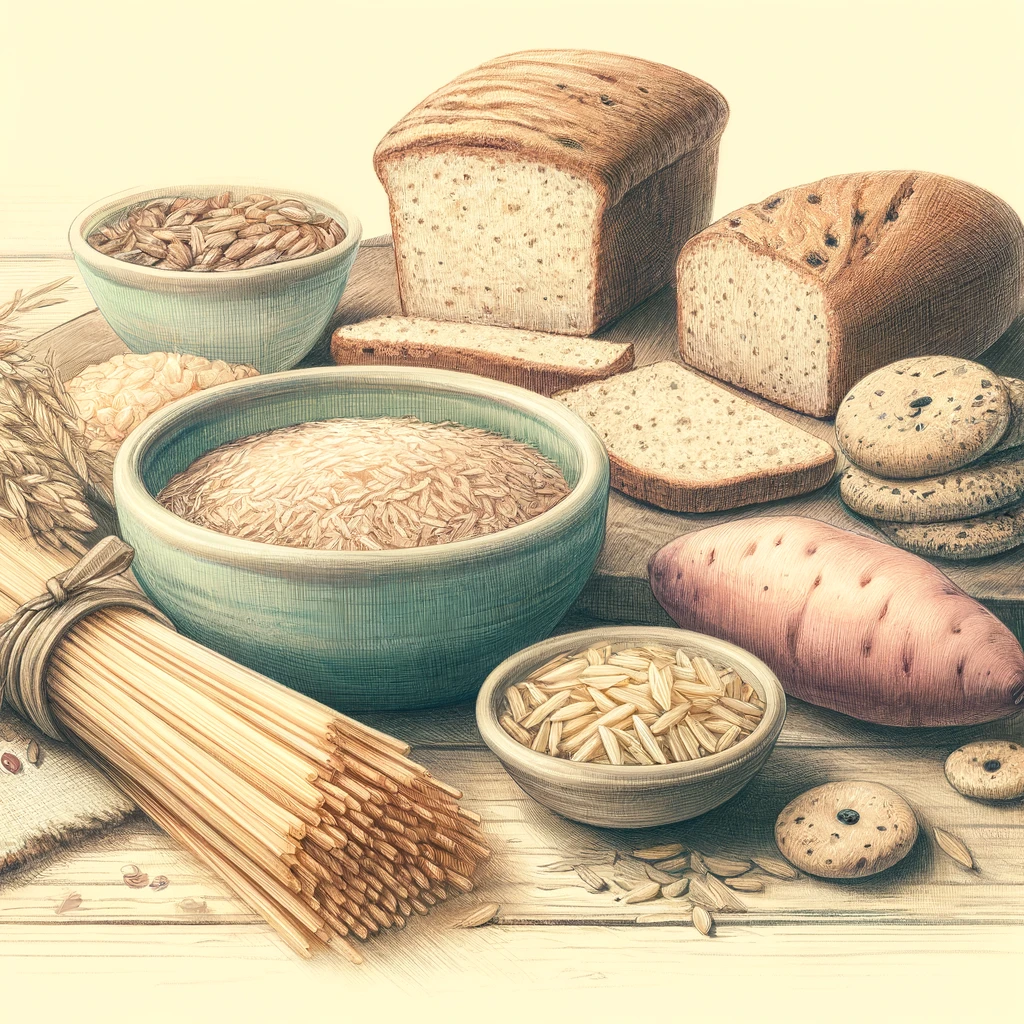Carbohydrates.
Carbohydrates are a vital part of a balanced diet, serving as the body's main source of energy. They are found in various forms, each with a different impact on health and well-being.
Types of Carbohydrates
There are three main types of carbohydrates:
- Sugars: Simple carbohydrates or "simple sugars," include glucose, fructose, and sucrose. They are found naturally in fruits, vegetables, milk, and also added to many processed foods.
- Starches: These are complex carbohydrates found in beans, whole grains, and vegetables. They break down into glucose during digestion.
- Fiber: Also a complex carbohydrate, fiber cannot be broken down by the body into sugar molecules and thus passes through the body undigested. Fiber is crucial for digestive health and helps regulate blood sugar levels.
Simple Carbohydrates
 Simple carbohydrates are quickly absorbed by the body and can provide immediate energy. However, they can also lead to spikes in blood sugar levels if consumed in excess.
Simple carbohydrates are quickly absorbed by the body and can provide immediate energy. However, they can also lead to spikes in blood sugar levels if consumed in excess.
Examples include:
- Table sugar
- Honey
- Milk (lactose is a natural sugar found in dairy)
- Fruits like bananas, apples, and oranges
- Processed foods such as cookies, cakes, and candies
Complex Carbohydrates

Complex carbohydrates are digested more slowly and offer a more sustained source of energy than simple carbohydrates. They are often rich in fiber, which can help improve cholesterol levels and maintain a healthy gut.
Examples include:
- Whole grains such as brown rice, whole wheat, oats, and barley
- Starchy vegetables like potatoes, sweet potatoes, and corn
- Legumes such as lentils, chickpeas, and black beans
- Pasta and noodles made from whole grains
Dietary Fiber
 Fiber is essential for healthy digestion and can help prevent constipation. Soluble fiber can help lower blood cholesterol and glucose levels. Insoluble fiber helps food move through the digestive system and increases stool bulk.
Fiber is essential for healthy digestion and can help prevent constipation. Soluble fiber can help lower blood cholesterol and glucose levels. Insoluble fiber helps food move through the digestive system and increases stool bulk.
Examples include:
- Soluble Fiber: Oats, peas, beans, apples, citrus fruits, carrots, barley, and psyllium
- Insoluble Fiber: Whole grains, nuts, beans, cauliflower, green beans, and potatoes
Importance of Carbohydrates in the Diet
Carbohydrates provide the body with glucose, which is converted to energy used to support bodily functions and physical activity. The quality and quantity of carbohydrates in a diet are important for health. Diets rich in high-fiber foods, such as whole grains and fruits, are associated with a lower risk of heart disease, diabetes, and certain types of cancer.
Low-Carb and Ketogenic Diets
Low-carb diets, such as the ketogenic diet, restrict carbohydrate intake to force the body to use fat as its primary fuel source. While these diets can lead to weight loss and may benefit some health conditions, they may also limit important nutrients provided by carbohydrate-rich foods.
The Glycemic Index
The glycemic index (GI) is a measure of how a carbohydrate-containing food raises blood glucose. Foods are ranked on a scale from 0 to 100. Foods with a high GI are absorbed quickly and cause a swift rise in blood glucose levels, while foods with a low GI have a slower absorption rate and produce gradual rises in blood glucose and insulin levels.
Common Myths About Carbohydrates
Carbohydrates Make You Fat
There's a common misconception that carbohydrates cause weight gain. Excessive intake of any calorie source can lead to weight gain — carbohydrates themselves are not the enemy. Balance and moderation are key, and it’s important to focus on whole carbohydrate sources that provide additional nutrients.
Carbohydrates are Unnecessary
Contrary to some popular diets that suggest cutting out carbohydrates, they are essential for optimal health. They are the body's main fuel source, and cutting them out can lead to a lack of energy and long-term health consequences if not managed carefully.
Gluten-Free Diets Are Healthier
Many people believe that going gluten-free is a healthier dietary option. However, gluten-free does not inherently mean healthy. Gluten-free diets are crucial for those with celiac disease or gluten intolerance, but for others, these diets can sometimes lack essential nutrients found in whole grains containing gluten. Gluten-free products can also be high in sugar and fats to improve taste and texture.
All Carbs Are the Same
This myth oversimplifies carbohydrates, grouping fiber-rich vegetables and whole grains together with highly processed sweets and sodas. The truth is that the type of carbohydrate matters. Complex carbohydrates, like those found in whole grains and legumes, provide sustained energy, vitamins, minerals, and fiber, which are all essential for health. In contrast, simple, refined carbohydrates often lead to quick energy spikes followed by crashes.
Carbs Should Be Avoided to Prevent Diabetes
While it's important to manage carbohydrate intake if you have diabetes, carbohydrates are not the direct cause of the disease. Type 2 diabetes is influenced by a combination of genetic and lifestyle factors, including overall diet, physical activity, and weight. Managing carbohydrate intake, particularly focusing on low-glycemic options, is crucial but eliminating them is not necessary for prevention or management.
Fruit Is Bad Because It’s High in Sugar
While fruits do contain natural sugars, they are also rich in vitamins, minerals, antioxidants, and fiber, which are beneficial for health. The fiber in fruit helps slow down digestion, reducing the impact on blood sugar levels
Carbohydrates Are Not Important for Athletes
Some believe that protein is all that matters for athletic performance. However, carbohydrates are just as essential as they provide the energy required during workouts. Without adequate carbohydrate intake, athletic performance can suffer, and recovery times may be extended. Carbs help to replenish glycogen stores that fuel muscles during high-intensity activities.